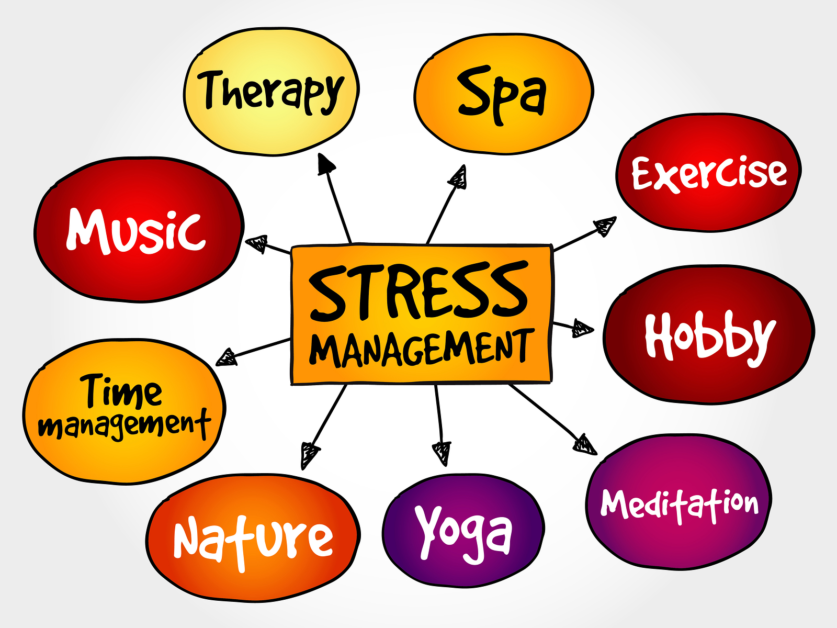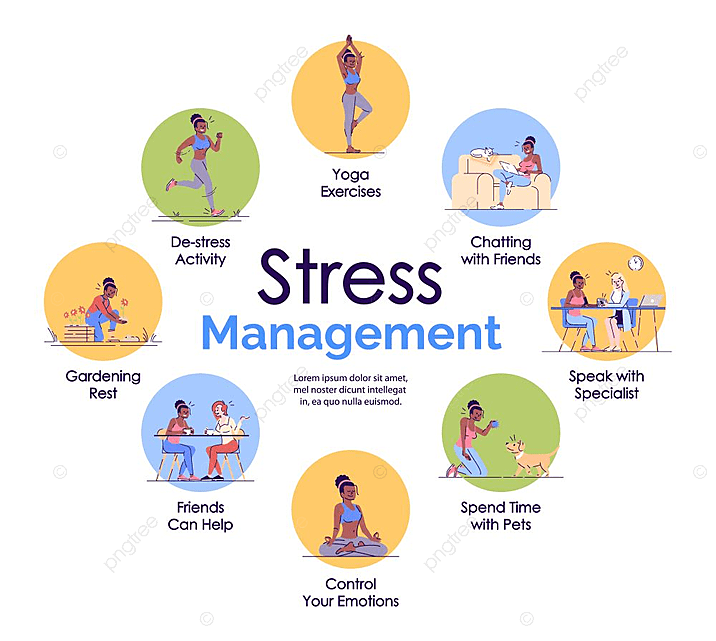Current Trends In Stress Management: New Secret Weapon to Success “Stress at Work and in Personal Life”
Stress is a normal part of life, but too much stress can have negative consequences for your physical and mental health. Work pressure and lifestyle factors stress.
- Overwhelmed by work pressure and lifestyle stress, there are a number of things you can do to manage your stress and improve your well-being. Some effective stress management techniques include mindfulness and meditation, yoga, exercise, nature therapy, and social support.
- Number of things you can do to manage stress at work and in your lifestyle, such as setting realistic goals and expectations, taking breaks, delegating tasks, taking time for yourself, getting enough sleep, eating a healthy diet, exercising regularly, and seeking professional help if needed.
Stress, stress, management, work ,Yoga, therapy
Current Trends In Stress Management: New Secret Weapon to Success “Stress at Work and in Personal Life”
Stress Management Due to Work Pressure and Lifestyle
Overview
Stress is a normal part of life, but too much stress can have negative consequences for your physical and mental health. Work pressure and lifestyle factors can be major contributors to stress.
Work pressure can come from many sources, such as tight deadlines, heavy workloads, difficult colleagues, and unrealistic expectations. Lifestyle factors that can contribute to stress include financial problems, relationship problems, family problems, and health problems.
If you are feeling overwhelmed by work pressure and lifestyle stress, there are a number of things you can do to manage your stress and improve your well-being.
Stress Management Techniques
Mindfulness and meditation: Mindfulness is the practice of paying attention to the present moment without judgment. Meditation is a type of mindfulness that involves focusing the attention on a single object or thought. Mindfulness and meditation have been shown to be effective in reducing stress, anxiety, and depression.
- Yoga: Yoga is a mind-body practice that combines physical postures, breathing exercises, and meditation. Yoga has been shown to be effective in reducing stress, improving sleep quality, and increasing overall well-being.
- Exercise: Exercise is another effective way to reduce stress. Exercise releases endorphins, which have mood-boosting effects. Exercise can also help to improve sleep quality and reduce fatigue.
- Nature therapy: Spending time in nature has been shown to reduce stress and improve mood. Studies have shown that people who spend time in nature have lower levels of the stress hormone cortical.
- Social support: Having strong social support networks can help to buffer the effects of stress. Talking to friends and family about your problems, spending time with loved ones, and joining social groups can all help to reduce stress levels.
In addition to these traditional stress management techniques, there are also a number of new and emerging trends in stress management. For example, some people are using wearable devices to track their stress levels and identify patterns. Others are using virtual reality and biofeedback to help them manage stress.
Managing Stress at Work
A number of things you can do to manage stress at work, such as:
- Set realistic goals and expectations. Don't try to do too much at once, and don't be afraid to say no to new projects or assignments if you are already feeling overwhelmed.
- Take breaks throughout the day. Get up and move around, or step outside for some fresh air.
- Delegate tasks. If you have the ability to delegate tasks, do it! This can help to free up your time and reduce your stress levels.
- Take time for yourself. Make sure to schedule time for yourself each day to relax and de-stress. This could involve reading, listening to music, taking a walk, or spending time with loved ones.
Managing Stress in Your Lifestyle
Number of things you can do to manage stress in your lifestyle, such as:
- Get enough sleep. Most adults need 7-8 hours of sleep per night. When you are well-rested, you are better able to cope with stress.
- Eat a healthy diet. Eating a healthy diet will give you the energy you need to get through the day and help you to feel your best.
- Exercise regularly. Exercise is a great way to reduce stress, improve your mood, and boost your overall health.
- Avoid unhealthy coping mechanisms. Avoid coping with stress in unhealthy ways, such as smoking, drinking too much alcohol, or overeating.
- Seek professional help if needed. If you are struggling to manage stress on your own, talk to your doctor or a mental health professional. They can help you to develop a personalized stress management plan.
End of Conclusion
Stress is a normal part of life, but too much stress can have negative consequences for your physical and mental health. Work pressure and lifestyle factors can be major contributors to stress.
If you are feeling overwhelmed by work pressure and lifestyle stress, there are a number of things you can do to manage your stress and improve your well-being. Some effective stress management techniques include mindfulness and meditation, yoga, exercise, nature therapy, and social support.
There are also a number of things you can do to manage stress at work and in your lifestyle, such as setting realistic goals and expectations, taking breaks, delegating tasks, taking time for yourself, getting enough sleep, eating a healthy diet, exercising regularly, avoiding unhealthy coping mechanisms, and seeking professional help if needed.
Additional tips for managing stress due to work pressure and lifestyle:
- Identify your stressors. The first step to managing stress is to identify the things that are causing you stress. Once you know what your stressors are, you can start to develop strategies for coping with them.
- Prioritize your tasks. It is important to prioritize your tasks and focus on health.
Writer
Devraj Gorai


























